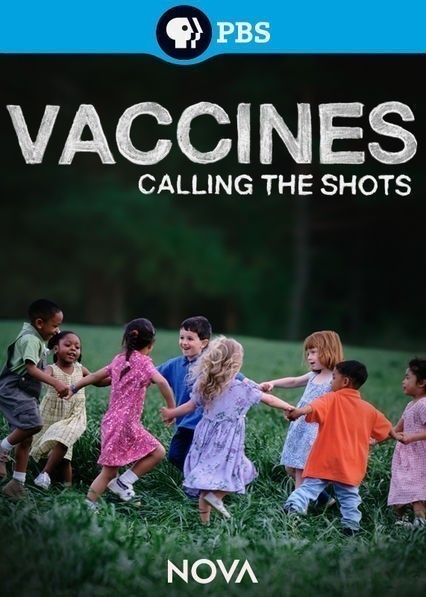
Earlier this year the debate between pro-vaxxers and anti-vaxxers once again flared up when a measles outbreak caused widespread concern. The debate got so heated that even President Obama put in his two cents worth and urged families to vaccinate their children so the county can maintain its so-called herd immunity. In the United States, herd immunity—created when a critical portion (93-95 percent) of a community is inoculated against contagious diseases—is 94.7 percent. However, these numbers aren’t spread evenly and in certain states they are significantly lower. In Colorado, for example, only 81.7 percent of children had the two-dose Measles Mumps Rubella (MMR) vaccination, compared with 99.7 percent in Mississippi.
Vaccines—Calling the Shots addresses the worrisome decline in immunization rates nationwide. In a well-rounded and balanced way, it looks at the importance of vaccines and clearly concludes that they are safe and effective, without downplaying the generally mild risks vaccines can pose.
The documentary, which aired last August on PBS, takes viewers are taken around the world to track epidemics. It also explores the science behind vaccinations and how parents wrestle with vaccine-related questions. The film’s conclusion leaves no room for interpretation: It is our shared responsibility to inoculate our children even when infection rates fall to zero. Only then can the resurgences of once eradicated diseases like measles and whooping cough be avoided.
Unfortunately, as a recent study found, it is nearly impossible to change an anti-vaxxer’s mind. The study, by political scientist Brendan Nyhan of Dartmouth College and three colleagues (2014), examined multiple strategies for communicating about the safety and importance of vaccines. Its findings, published in the journal Pediatrics, concluded that current public health communications about vaccines are not effective. In fact, as Nyhan and his peers found, for some parents they may actually increase misperceptions or reduce vaccination intention. Attempts to increase concerns about communicable disease of correct false claims about vaccines may be especially likely to be counterproductive.
For example, scientists have worked tirelessly to confirm Dr. Andrew Wakefield’s controversial 1998 small-scale study that argued there was a link between autism and the MMR vaccine. In response to Wakefield’s study, scientists examined the medical records of hundreds of thousands of children. But study after study revealed that whether the children were vaccinated or not, the rates of autism were the same. Eventually, as Alison Singer of the Autism Science Foundation notes in Vaccines, no one could replicate Wakefield’s findings and the study was shown to be fraudulent and was consequently withdrawn.
Dissatisfied with the outcome of these studies, a group anti-vaxxers helped fund a six-year study looking into the effects of vaccinations on the neurological development and social behavior of rhesus macaque (a type of monkey) infants. The study concluded that there was no evidence at all for a link between vaccines and autism. The anti-vaxxers who helped fund the study, weren’t happy with its findings, which were published in the Proceedings of the National Academy of Sciences in early October, and they wanted to see a re-analysis of the data.
Reviews of Vaccines published on anti-vax websites, and their readers’ statements in the comment sections, show a similar kind of stubbornness and they state that all the studies mentioned in the documentary are part of a big pharmaceutical conspiracy.
For all these reasons, Vaccines is unlikely to convince the staunch anti-vaxxer. However, with its clear and no-nonsense approach, the documentary might reach parents who are on the fence.
Elke Weesjes Sabella is former editor of the Natural Hazards Observer. She joined the staff in December 2014 after a brief stint as a correspondent for a United Nations nonprofit. Under her leadership, the Observer was revamped to a more visual format and one that included national and international perspectives on threats facing the world. Weesjes was the editor of the peer-reviewed bimonthly publication United Academics Journal of Social Sciences from 2010 to 2013.
Weesjes Sabella also worked as a research associate for the Center for Disaster and Risk Analysis, formerly located at Colorado State University (although no longer active). In that role, she collected and analyzed data and translated research findings for a broader audience. She played a central role in finalizing the Disaster Preparedness among Childcare Providers in Colorado project, which examines all-hazards preparedness in daycares and in-home childcare across Colorado. She co-authored the report based on the first stage of the project, which was funded by Region VIII of the Federal Emergency Management Agency.
Weesjes Sabella specializes in cultural memory and neighborhood/community change in times of acute and chronic stress. She has published articles on the impact of drought on farming communities in Kansas, the effects of Superstorm Sandy in Far Rockaway, Queens, urban renewal in the Bedford-Stuyvesant neighborhood in Brooklyn, and health services for vulnerable populations in the South Bronx.
Weesjes Sabella received her PhD from the University of Sussex. Her dissertation, Children of the Red Flag: Growing up in a Communist Family During the Cold War (2012), as well as the majority of her publication record, share the common methodology of understanding culture and identity through oral history.